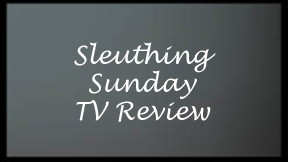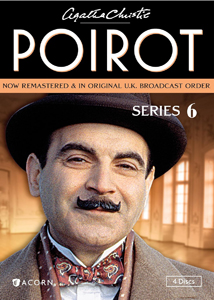The four novels adapted for “Agatha Christie’s Poirot” Season 6 (1994-95, ITV) aren’t on anyone’s list of the very elite, but the cast and crew bounce back from a relatively weak Season 5 for four thoroughly enjoyable movie-length episodes – including one worthy of your regular Christmas rotation.
The teleplays and production design elevate each of these novels, and the three best have a big casting decision as we get to see a colorful character brought to life – and in the other one, we get to see future star Damian Lewis.
This would be the last season of roughly the “first half” of the series. The next season wouldn’t come around until 2000, so some fans at the time might’ve wondered if this was Poirot’s last bow. Thankfully, it was not, but if it had been, the show would’ve gone out at the top of its game. Here are my rankings of Season 6’s four episodes:

“Agatha Christie’s Poirot” Season 6 (1994-95)
ITV, four episodes
Writers: Clive Exton, Anthony Horowitz, Douglas Watkinson
Stars: David Suchet, Hugh Fraser, Philip Jackson, Pauline Moran
1. “Hercule Poirot’s Christmas” (episode 1, written by Clive Exton)
My main complaint about the book is there’s not enough holiday cheer. Director Edward Bennett’s adaptation rectifies this without going overboard. It’s chilly and Poirot desires central heating, as the furnace in his flat is broken; he and Japp exchange gifts; one of the guests at the large Lee mansion festively plays with a balloon; and the score has a Christmasy tinkle.
I like how the ghastly, house-filling groan (supposedly) from the murder victim fills the whole house. It’s over-the-top yet appropriate for a story with echoes of “A Christmas Carol.” Vernon Dobtcheff is delicious in the Scrooge role as the wheelchair-bound, diamond-loving Simeon Lee, who has not mellowed with age. (And indeed every actor matches who I saw in my mind’s eye when reading.) He loves taking advantage of his children and grandchildren, knowing they have to play ball to get something in his will.
Exton streamlines the plot nicely. I remembered whodunit from Christie’s book, as it is one of the most famous subversive answers as she redefined what was allowed in mystery fiction. Although it’s impossible to experience both the novel and the show as the first experience, I’m guessing that viewers who come to the episode cold will have a fair chance at guessing the killer’s identity – and it will be like opening a Christmas present if they are correct.
If you must choose one “Poirot” Christmas episode for your rotation, this one tops Season 3’s “The Theft of the Royal Ruby” in plot, characters and – most importantly – holiday flavor. Curl up with a cup of hot sirop and press play.
Novel: “Hercule Poirot’s Christmas” (1938)
2. “Dumb Witness” (4, Douglas Watkinson)
Watkinson skillfully adapts a novel that would’ve fallen flat if faithfully translated. In the book (alternately titled “Poirot Loses a Client”), Poirot is driven to find justice for a murdered woman whose plea for help reaches him too late. The TV version gets him on the scene sooner – via Hastings bringing Poirot along on a visit to an old military friend looking to set a boating speed record — so he can meet the matriarch and suspects in advance.
Like the other Season 6 entries, a guest star stands out, but this time he’s of the four-legged variety: an uncredited white-haired fox terrier who plays Bob. It’s cute how Poirot is hesitant to pet the dog, and annoyed that he must take him in after Emily Arundel’s murder, but then he gets somewhat attached.
Although this novel gets lost among Christie’s incredible Thirties output, it has fun clues such as the question of who put the tripwire on the stairs (Bob knows, but can’t talk), and who has the initials “T.A.” on their robe, as seen by a groggy sleeper. Watkinson plays the psychic sisters mostly for amusement – as Poirot must humor them — but the green cloud (a clue) that surrounds Emily upon her demise is a nice pseudo-supernatural touch.
Though this is a trope-filled episode, with Poirot and Hastings staying near a mansion of spiteful relatives where murder looms, it’s doggone good.
Novel: “Dumb Witness” (1937)
3. “Murder on the Links” (3, Anthony Horowitz)
I don’t know if there was always a rhyme or reason for the episode chronology being different from the book chronology, but moving this early novel later in the timeline makes sense. For one, we get Hastings’ meeting with wife-to-be Bella (Cinderella in the novel). This makes for a nice automatic explanation for Hastings gradually ceding his sidekick role in later tales (as opposed to his venture in Argentina in the novels).
While Hugh Fraser and Jacinta Mulcahy are a bit thin on chemistry (though not as off-point as Poirot and the Countess), Fraser masters the distracted look of a schoolboy with a crush. And it doesn’t matter in the long run, because – as with the novels – Hastings’ love interest won’t return. I’ll be interested to see if Bella even gets mentioned.
Another highlight is Bill Moody as Giraud, an arrogant French detective (don’t worry, the actors speak English) who styles himself after Sherlock Holmes (with a pipe here, and a magnifying glass in the novel). Moody, who could easily play Teddy Roosevelt, is perfect, and Suchet is equally on point with Poirot’s calm exasperation at this “professional” for whom Clue A can only lead to Conclusion B – the dream detective for a criminal looking to frame someone.
Similar to how “Hercule Poirot’s Christmas” adds holiday flavor, the “Links” adaptation adds more golf, with Hastings excited to play on a top course and Poirot being mildly annoyed by the game. We get bits of humor like Poirot mistaking Hastings’ “handicap” for his “disability.” Horowitz generally maintains the convolutions of Christie’s early, not-so-streamlined plot, for better and worse.
Novel: “Murder on the Links” (1923)
4. “Hickory Dickory Dock” (2, Horowitz)
Horowitz takes one of Christie’s most convoluted and ridiculous plots and streamlines it while maintaining its best aspect – the unusual (for Christie) setting of a university hostel – and translating a Fifties book to the show’s Thirties setting. It’s refreshing to see these fresh young faces, with Lewis (“Life”) being a particularly nice surprise. This is also a rare episode with an American-accented character amid all the Brits – Sally Finch (Paris Jefferson, ironically a Brit).
Some have criticized the adaptation for solving the problem of Christie’s stereotypical portrayals of non-white students by simply excising all those characters. But I think it’s understandable, as the casting director made the demographics match what was likely for the 1930s. It’s also nice to see Miss Lemon (Pauline Moran) back, and while her “in” is that she’s the sister of the hostel’s warden, this isn’t a TV contrivance; it comes from the book.
The plot, whether in the book or on TV, does not make sense – something about a smuggling ring that’s relying on students to purchase rucksacks with secret compartments, then sneaking diamonds into them when the student travels to another country, then retrieving them back in England. If you’re thinking “That needs a little more logistical explanation,” you’re right, but we don’t get it.
Director Andrew Grieve tries to justify the nursery-rhyme title in a way Christie didn’t, by regularly cutting to a mouse climbing a grandfather clock’s innards and having its run of the hostel. He also strives to add a “ticking clock” aspect that isn’t in the plot, by literally showing the clock ticking. He somewhat succeeds.
Less stylishly, Horowitz rounds the episode out with the type of humor (involving Poirot’s bidet, and Japp’s meal of “faggots” and “spotted dick”) I might’ve also written in 1994, but my excuse is I was a high school junior at the time. That said, the temporary domesticity between Poirot, Japp (a mess with his wife out of town) and Miss Lemon is worth several smiles.
Novel: “Hickory Dickory Dock” (1955)
IMDb Top 250 trivia
- “Poirot” stands at No. 151 in the IMDb TV rankings, with an 8.6 rating.
- IMDb users agree with my rankings, giving “Christmas” an 8.0 and “Hickory” a 7.6.
- And they agree that this is the better of the two Christmas episodes, giving Season 3’s “Ruby” a 7.5.
Sleuthing Sunday reviews the works of Agatha Christie, along with other new and old classics of the mystery genre.


